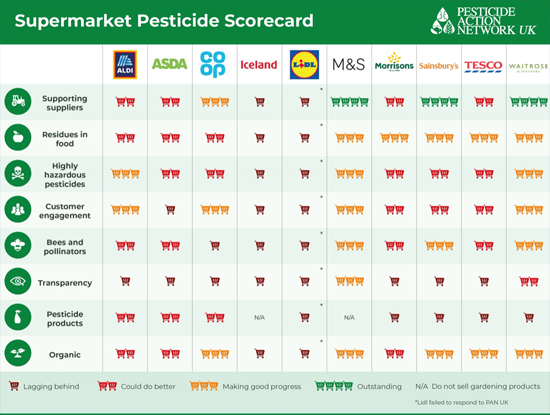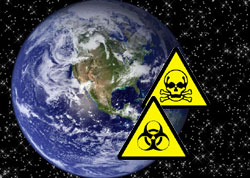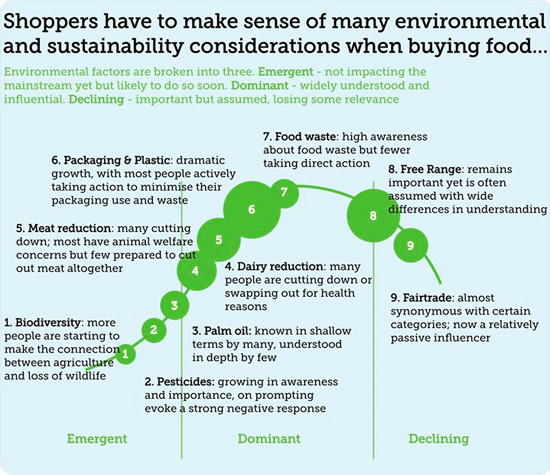In all the alarms being signalled for the risk to Bees and Bio-diversity as a whole and to human health as a result of toxic chemicals being used in agriculture and farming, the supermarkets who sell the edible produce and indeed even the pesticides concerned e.g. Round-Up; little is being said about the part being played by supermarkets in the UK in selling toxic products to the public.

Pesticides can drive irreversible harms to both human health and the environment. The evidence linking pesticides to diseases such as cancer and Parkinson’s increases year-on-year. Meanwhile, recent studies have named pesticides as one of the key drivers of biodiversity losses which have placed one million species at risk of extinction.
The evidence clearly shows that we urgently need to reduce our pesticide use and UK supermarkets have a key role to play. With their sprawling supply chains and powerful influence over how food is produced, they are uniquely positioned to drive a wholesale shift away from pesticides and towards non-chemical alternatives, not just in the UK but globally.Pesticide Action Network UK (PAN UK) has criticised supermarkets for failing to be transparent about pesticides in their global supply chains. It has also revealed that UK supermarkets are not doing enough to protect human health and the environment from the most hazardous pesticides, which can include carcinogens, reproductive toxins and endocrine disruptors that interfere with hormones.
Despite being critical of the supermarket sector as a whole, PAN UK’s listing does clearly reveal that some companies are doing much better than others. M&S, Waitrose and Sainsbury’s were found to be ‘making good progress’ while Co-op, Tesco, Morrisons and Aldi received a middling ranking of ‘could do better’. Meanwhile, Asda and Iceland are ‘lagging behind’. Lidl was the only supermarket which failed to respond to the PAN UK survey and so came last.
Josie Cohen from PAN UK said:
“UK shoppers are increasingly concerned about the impact of pesticides on their own health, the health of farmers and the natural environment. But supermarkets aren’t being open about pesticides, so a concerned shopper trying to find out what chemicals they and their family are exposed to has nowhere to go. The information isn’t on food labels or supermarket websites. Customers have the right to know which food contains the most pesticides so, at the very least, supermarkets should be publishing the results of their in-house residue testing schemes.”
 PAN UK surveyed and ranked the 10 supermarkets with the largest share of grocery sales against eight criteria related to pesticides.
PAN UK surveyed and ranked the 10 supermarkets with the largest share of grocery sales against eight criteria related to pesticides.
The findings highlighted the following concerns:
*
UK supermarkets are not doing enough to reduce the harms caused to bees and other pollinators by their operations. For example, Aldi is the only supermarket to have completely prohibited the use of bee-toxic neonicotinoids (which were banned by the EU in 2018) throughout its global supply chains.
* All UK supermarkets allow the use of pesticides in their global supply chains which meet the UN criteria for ‘Highly Hazardous Pesticides’ (HHPs) due to their high potential to cause harm to human health or the environment.
* All UK supermarkets with a gardening section (which excludes M&S and Iceland) continue to sell pesticide products, providing little or no information beyond what is on the label to customers on the potential risks to human health and the environment, or how best to avoid them.
* Some UK supermarkets have become less transparent over the past decade with regards to pesticides.
For example, Co-op and M&S used to publish the results of their in-house residue testing programme so shoppers could find out which pesticides appear in the food they buy.
However, not a single supermarket currently publishes this information. In addition, almost all supermarkets have lists of specific pesticides which are either monitored, restricted or banned entirely from being used in their global supply chains. M&S is the only supermarket which currently makes their lists publically available.
In general, the higher-end supermarkets are doing more to reduce pesticide-related harms linked to their global supply chains. As a result, shoppers concerned about pesticides who are on lower incomes are often left with little choice but to shop at supermarkets with weaker standards.
Josie Cohen added:
“Most of the pesticides used in global agriculture are entirely unnecessary. There are tried and tested non-chemical alternatives which protect human health and don’t trash the environment but still produce the amount of food we need.”
She concluded:
“The ranking has revealed that the pricier supermarkets tend to be doing more to tackle pesticides. But the truth is all UK supermarkets make huge profits so there is absolutely no need to pass the cost of pesticide reduction on to customers. If we are to have any chance of reversing the current biodiversity and public health crises, then all supermarkets need to step up and do more to prevent pesticide-related harms.”
PAN UK says that it is keen to work directly with UK supermarkets to help them implement the kind of changes we so urgently need to move towards a healthier and more sustainable future.
Ten additional key findings:
1. Aldi is the only supermarket which does not allow the use of any pesticide that is banned by the European Union anywhere in its global supply chains. This is significant given that the European Union has the strictest pesticide regime in the world and has therefore banned many hazardous pesticides which are allowed for use in other countries.
 2. Asda, Morrisons, Sainsbury’s, Tesco and Waitrose test produce specifically for glyphosate residues. However, no other supermarkets do so despite glyphosate’s overuse in global agriculture and widespread public concern regarding its potential impacts.
2. Asda, Morrisons, Sainsbury’s, Tesco and Waitrose test produce specifically for glyphosate residues. However, no other supermarkets do so despite glyphosate’s overuse in global agriculture and widespread public concern regarding its potential impacts.
3. Morrisons, Sainsbury’s, Tesco and Waitrose offer deals and discounts to their customers on pesticide products. This contravenes the UN International Code of Conduct on Pesticide Management which says that retailers should not offer “…incentives or gifts to encourage the purchase of pesticides” (see clause 11.2.18).
4. Unlike other supermarkets, M&S, Tesco and Waitrose appear not to include fish as standard in their in-house residue testing programmes. This is despite the common overuse of pesticides on fish farms.
5. M&S, Waitrose and Sainsbury’s were ranked as ‘Outstanding’ in their efforts to support suppliers to use non-chemical alternatives. All three companies received full marks because they are conducting research and training, offering bespoke advice and guidance documents and enabling farmers and growers to come together to share learnings on pesticide reduction.
6. While Aldi has completely banned the use of bee-toxic neonicotinoids throughout its global supply chains, Waitrose have severe restrictions in place. They don’t allow their suppliers
anywhere in the world to use neonicotinoids “…unless a valid justification presented, detailed risk analysis and elimination plans have been drawn up and agreed with Waitrose”.
7. M&S is the only supermarket which told PAN UK that they make efforts to use imperfect produce in their prepared meals. Making sure that ‘wonky’ fruit and vegetables aren’t thrown away is one way that supermarkets can reduce the need for cosmetic pesticides.
8. Rather than conducting their own research or training for suppliers on adopting non-chemical alternatives to pesticides and protecting pollinators, many supermarkets outsource these activities to external companies and organisations which don’t go as far as they could on reducing pesticide related harms.
9. Only Waitrose and M&S make publically available their examples of ‘best practice’ which detail efforts by their suppliers to reduce pesticides and adopt non-chemical alternatives. Meanwhile, Sainsbury’s and Co-op appear to collect this information but do not put it in the public domain. This lack of transparency holds back the sector which could be moving forward together to reduce pesticide-related harms.
10. While Aldi and Lidl are often considered each other’s closest competitors, Aldi was extremely responsive to PAN UK while Lidl was the only supermarket to ignore all of our communication requests.

What can UK shoppers do?
There are a range of things that shoppers can do to encourage their supermarket to take action on pesticides:
*
Tell their supermarket to reduce pesticide-related harms linked to their global supply chains. Shoppers can do this via PAN UK’s quick online action or in person in-store.
*
Stop buying pesticide products so supermarkets get the message that they shouldn’t sell them. Buy the wonkiest vegetables possible, thereby reducing the need for cosmetic pesticides.
*
Congratulate their supermarket if they find a bug in fresh produce. Complaints from customers about bugs are one of the factors holding supermarkets back from reducing their pesticide use.
*
Buy local, seasonal vegetables from their supermarket whenever possible, reducing the need to use fungicides which prevent produce from rotting while being transported.
*
Buy organic when possible to let supermarkets know that the demand is there. Shoppers who can’t afford or access a fully organic diet, can find out which items to prioritise by checking PAN UK’s Dirty Dozen and Clean Fifteen lists.
Source: PAN UK press release / Soil Association



 PAN UK surveyed and ranked the 10 supermarkets with the largest share of grocery sales against eight criteria related to pesticides.
PAN UK surveyed and ranked the 10 supermarkets with the largest share of grocery sales against eight criteria related to pesticides.  2. Asda, Morrisons, Sainsbury’s, Tesco and Waitrose test produce specifically for glyphosate residues. However, no other supermarkets do so despite glyphosate’s overuse in global agriculture and widespread public concern regarding its potential impacts.
2. Asda, Morrisons, Sainsbury’s, Tesco and Waitrose test produce specifically for glyphosate residues. However, no other supermarkets do so despite glyphosate’s overuse in global agriculture and widespread public concern regarding its potential impacts. 